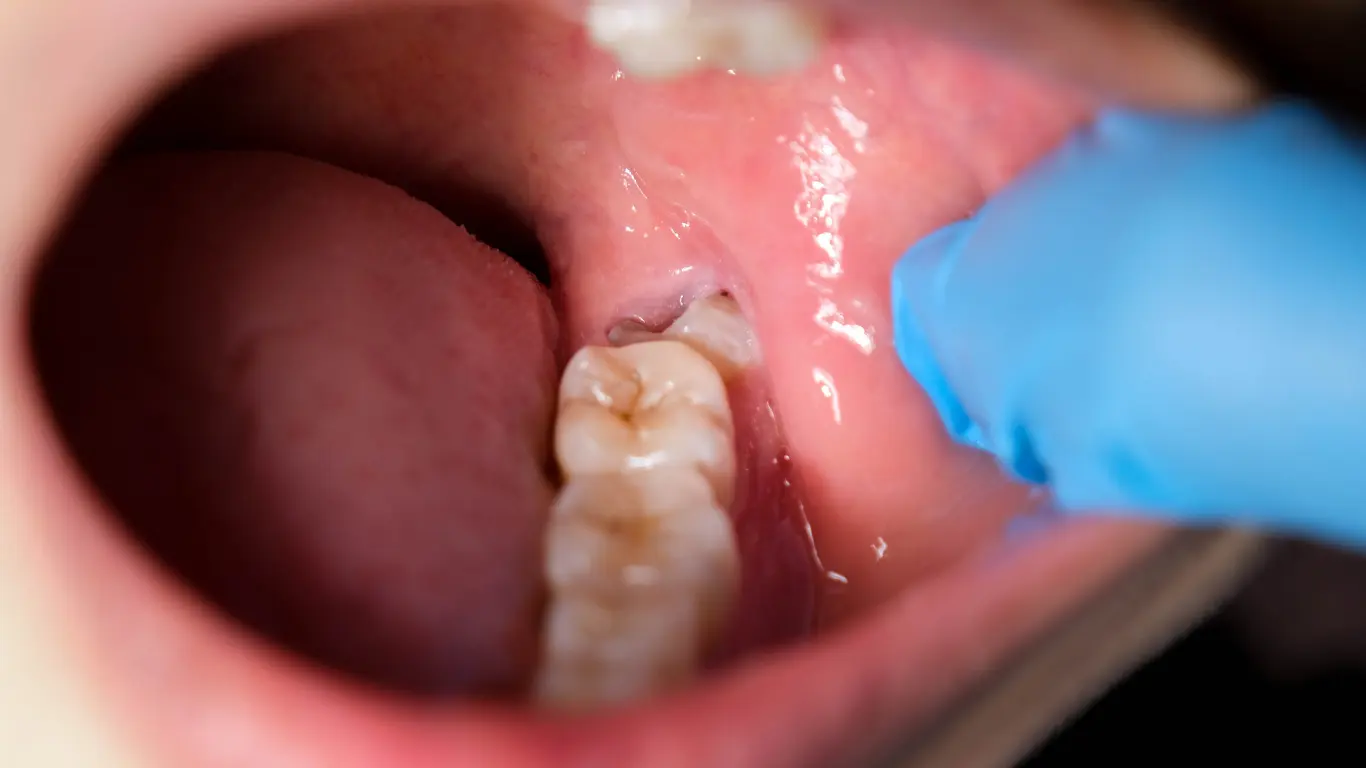Can Wisdom Teeth Grow Back After They’ve Been Removed? Explained
Many people are confused about wisdom teeth. Many wonder if wisdom teeth can grow back after removal. Short answer: no. Once extracted, wisdom teeth cannot regrow. After their wisdom teeth are pulled, some people develop supernumerary teeth, a rare disorder.
This affects a small number of people, and these extra teeth can grow anywhere. Interestingly, dental X-rays identify them. Studies suggest a 2% probability of getting supernumerary teeth, which typically appear on X-rays. If you have your wisdom teeth removed, you should be aware of this rare genetic abnormality.
We’ll discuss wisdom teeth, their purpose, and why they’re removed in this blog. Read on to learn about these distinctive teeth and the possibility of more ones after removal, including is it possible for wisdom teeth to grow back and what happens if it feels like your tooth growing back after extraction.
What Are Wisdom Teeth?
Wisdom teeth, or third molars, emerge last. Most people have four wisdom teeth: one on each side of the upper and lower jaw. The phrase “wisdom teeth” refers to their appearance between 17 and 25, when many enter adulthood.
Human evolution was influenced by these molars. Early humans needed more teeth to consume raw, rough foods. Why do humans have wisdom teeth? Wisdom teeth were necessary for grinding and eating. Wisdom teeth become less necessary as humans eat softer, prepared food. Our jaws shrank, but our wisdom teeth stayed.
Wisdom teeth once helped humans survive, but now they inflict more harm. Due to jaw space constraints, they may partially erupt or become impacted, causing pain, infection, or tooth crowding. Thus, many people remove their wisdom teeth to avoid these issues.
Wisdom teeth are less important today, but understanding their evolution and why they’re removed might help you care for them. If you’re wondering does everyone have wisdom teeth, the answer is that many people do, but some never develop them.

Why Do We Have Wisdom Teeth — and Why Are They Often Removed?
Wisdom teeth are interesting, but why do we have them when they cause more difficulty than they’re worth? Evolutionary history holds the answer.
With wider jaws, our ancestors needed more teeth to eat tough, uncooked foods. They needed third molars to crush their fibrous, raw food. As diets shifted to softer, prepared foods, these extra teeth were unnecessary. Wisdom teeth remained when our jaws shrank.
Today, our jaws are too small to fit them, causing complications. Impaction can cause pain, swelling, and infection as wisdom teeth develop. Many people visit an oral surgeon to remove their wisdom teeth.
Wisdom teeth that remain partially or fully impacted might irritate neighbouring teeth and gum tissue, causing misalignment, pain, and long-term dental health difficulties. Some wisdom teeth may be removed to avoid these issues. If you’re not having problems now, frequent dental checkups and X-rays can detect wisdom tooth abnormalities before they worsen. If you notice signs your wisdom teeth are coming in, contact your dentist for an evaluation.
Can Extra Teeth Grow After Wisdom Tooth Removal? (Hyperdontia Explained)
Some people are shocked to learn that supernumerary teeth may emerge after wisdom teeth are removed. Hyperdontia occurs when more teeth grow than the average 32 permanent teeth. Can a wisdom tooth grow back? Not really, but hyperdontia can make it seem like wisdom tooth regrowth is happening. (To be clear: can wisdom tooth grow back, can your wisdom teeth grow back, and does your wisdom teeth grow back are common searches, but biologically the original tooth does not regrow.)
Hyperdontia can sprout extra teeth anywhere in the mouth, frequently where teeth join to the jaw. These teeth may be of various sizes and forms and not obvious unless they cause pain, crowding, or alignment concerns. Additional primary teeth are more prevalent than additional permanent teeth in hyperdontia, which is rare in children and adults.
After wisdom teeth removal, supernumerary teeth may be a concern, but routine dental X-rays usually detect them. If these extra teeth cause issues, a dentist or oral surgeon can usually remove them. This explains can a wisdom tooth grow back, can teeth grow back after extraction, and is it possible for a wisdom tooth to grow back.
Common Symptoms and Signs of Hyperdontia
Hyperdontia, a disorder in which extra teeth grow beyond the regular set of primary or permanent teeth, can go unnoticed unless it causes dental issues. The growth of extra teeth behind or around existing teeth is the most prevalent symptom of hyperdontia. Supernumerary teeth may occur anywhere in the mouth, especially where teeth typically fit.
Although kids can get into this situation, adults are most likely to. It’s curious that hyperdontia is more common in men, and the upper jaw has more extra teeth. The extra teeth may be buried behind the gum line.
Extra teeth can be painful, uncomfortable, or swollen if they grow in a way that affects how your other teeth fit together. They may cause crowding, which can affect biting alignment and tooth health. Dental examinations and X-rays can detect hyperdontia early and avoid subsequent issues.
This can sometimes make people think do wisdom teeth grow back or can wisdom teeth regrow, these extra teeth are not the same as wisdom teeth.
When Is Treatment for Hyperdontia or Extra Teeth Needed?

Treatment may not be needed for many hyperdontia patients. If the extra teeth do not cause pain, discomfort, or alignment concerns, no action is needed. However, treatment may be needed to prevent overcrowding, tooth misalignment, and gum discomfort from supernumerary teeth.
If you have any of these symptoms, see a dentist or oral surgeon:
- Pain or pain where extra teeth are growing
- Infection or swelling around extra teeth
- Overcrowding makes dental cleaning difficult.
- Possible tooth misalignment or damage
Knowing that supernumerary teeth can develop anywhere in the mouth, but wisdom teeth cannot, is equally significant. These extra teeth are not always wisdom teeth and can emerge at any age. If you think you have extra teeth, your dentist will use X-rays to identify the best treatment.
Your dentist may suggest removing excess teeth to relieve pain, reduce overcrowding, and protect tooth health. Routine dentist appointments can detect early issues and improve dental health. Consult a dentist if you suspect hyperdontia or additional teeth.
What Are the Symptoms of an Impacted Wisdom Tooth?
When the mouth is too small for the wisdom tooth to emerge, it becomes impacted. People who have an impacted wisdom tooth may not have any signs at all. However, if an impacted tooth causes infection or other issues, you may have a variety of symptoms that require dental care.
Impacted wisdom teeth symptoms most often include:
- Swollen gums: The gums around the impacted tooth may swell.
- Tender gums: The gums around the impacted tooth may be painful.
- Bleeding gums: Inflammation surrounding the tooth might cause bleeding during brushing or flossing.
- Jaw swelling: You may see swelling behind your jaw.
- Jaw pain: Pressure from the impacted tooth may cause jaw pain.
- Difficulty opening your mouth: Swelling and pain from the impacted tooth can make opening your mouth difficult.
Visit your dentist if you have these symptoms. Bad breath or a poor taste often accompanies these medical conditions. Early dental care can prevent complications and treat the impacted tooth.
Should I Be Concerned If It Feels Like My Wisdom Teeth Are Growing Back?
Understanding the reasons and severity of wisdom tooth regrowth feelings is crucial. Many conditions can make you think wisdom teeth are returning, even while they don’t.
Your dentist will watch for these key indicators of wisdom tooth issues:
- Misplaced wisdom teeth: Incorrectly positioned wisdom teeth can trap food and harbour cavity-causing bacteria. Pain, swelling, and infection might result.
- Emerging wisdom teeth improperly: Crooked wisdom teeth may not fully emerge, making it hard to clean between the molars. This can cause dental health complications from plaque buildup.
- Wisdom teeth partially erupted: Gum infections, swelling, and discomfort can result from bacteria growing in partial eruption pockets. Your mouth may feel like your teeth are growing back or changing.
- Insufficient space for wisdom teeth: If your jaw is too small, wisdom teeth may crowd or harm nearby teeth as they emerge.
Impacted wisdom teeth can cause cysts that damage surrounding dental roots and the jawbone. For any pain or symptoms, see your dentist. They can analyse the issue and prescribe treatment to prevent consequences.
It may feel like your wisdom teeth are coming in, or do your wisdom teeth grow back, but you may be having problems with impacted or misplaced teeth. Regular dental checkups prevent problems and maintain oral health.
Key Takeaways About Wisdom Teeth Regrowth and Oral Health
After removal, wisdom teeth won’t grow back. Sometimes people grow supernumerary teeth, which can appear anywhere in the mouth. Dentists can discover these extra teeth, which are not wisdom teeth, using normal X-rays. Wisdom teeth don’t renew, so monitor your dental health to spot problems early. Regular dental checkups will detect and treat additional teeth.
If you feel like can wisdom teeth grow back after removal, remember that can wisdom teeth grow back after being pulled or do wisdom teeth come back are myths — but extra teeth (hyperdontia) are possible.
For those considering tooth extraction, proper care and follow-ups are essential. If you ever need replacements, teeth implant Turkey options can be affordable.
Maintain your oral hygiene, especially during day by day wisdom teeth recovery timeline, and follow dentist advice on what to eat after wisdom teeth removal.
So, while can you regrow wisdom teeth or does wisdom teeth grow back are common questions, the simple truth remains; wisdom teeth do not grow back.














